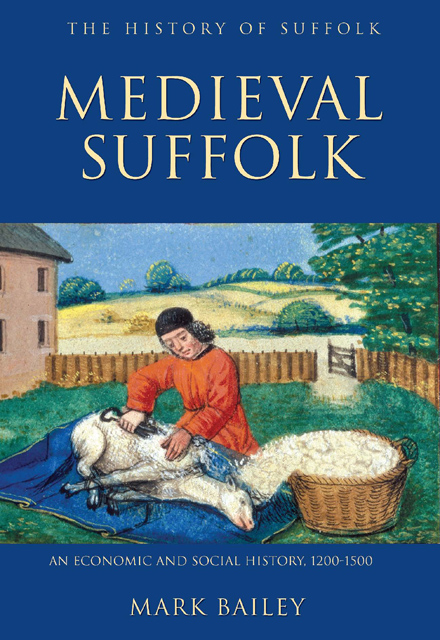Book contents
- Frontmatter
- Contents
- List of Plates
- List of Maps
- List of Tables
- Foreword
- Acknowledgements
- Note on Currency & Units of Measurement
- Abbreviations
- 1 Introduction
- 2 Landlords and their Estates, 1200–1349
- 3 Peasants and their Lifestyles, 1200–1349
- 4 The Agrarian Economy, 1200–1349
- 5 The Suffolk Landscape, 1200–1349
- 6 Towns and the Urban Environment
- 7 Commerce, Crafts and Industry
- 8 Pestilence, Rebellion and the Decline of Villeinage, 1349–1500
- 9 The Rural Economy, 1350–1500
- 10 ‘The World Turned Upside Down’: Rural Society, 1350–1500
- 11 Towns, Trade and Industry, 1350–1500
- 12 Conclusion
- Bibliography
- Index
2 - Landlords and their Estates, 1200–1349
Published online by Cambridge University Press: 15 March 2023
- Frontmatter
- Contents
- List of Plates
- List of Maps
- List of Tables
- Foreword
- Acknowledgements
- Note on Currency & Units of Measurement
- Abbreviations
- 1 Introduction
- 2 Landlords and their Estates, 1200–1349
- 3 Peasants and their Lifestyles, 1200–1349
- 4 The Agrarian Economy, 1200–1349
- 5 The Suffolk Landscape, 1200–1349
- 6 Towns and the Urban Environment
- 7 Commerce, Crafts and Industry
- 8 Pestilence, Rebellion and the Decline of Villeinage, 1349–1500
- 9 The Rural Economy, 1350–1500
- 10 ‘The World Turned Upside Down’: Rural Society, 1350–1500
- 11 Towns, Trade and Industry, 1350–1500
- 12 Conclusion
- Bibliography
- Index
Summary
Suffolk society in the Middle Ages was neither simple nor unchanging, yet throughout the period it was dominated by a small group of landlords who held a disproportionate amount of land. Few of these lords were regular soldiers (although male members of their family, such as younger sons, may have pursued a military career), and most were ecclesiastics, administrators and/or engaged in agriculture. Their standing in society was determined largely by their wealth, which in turn owed much to the size of their landed estate, although it was also influenced to some degree by the tenure on which that land was held, the standing of their family and the status of their social contacts. This explains why even the relatively small proportion of well-to-do people who earned most of their living away from the land, such as career soldiers, merchants or lawyers, sought to convert their financial success into the acquisition of land. Degrees of wealth also determined degrees of political power, which was exercised as Members of Parliament, in the retinue of a greater lord, or in the service of the Crown. A wealthy earl or bishop could be a major player in national politics and government, while a wealthy knight could wield significant political power within a single county as the holder of a local government office – such as sheriff, escheator, tax collector or Justice of the Peace – or as a prominent estate official of a major landlord.
Wide differences in wealth and power were evident among the ranks of landlords. The uppermost ranks comprised the aristocracy (earls, barons and, from the late fourteenth century, the new rank of duke), together with closely analogous ecclesiastical landlords such as bishops and the wealthier abbots. The links between lay and ecclesiastical landlords were often close, because their lifestyles displayed similarities and the religious orders drew many recruits from aristocratic families. Aristocrats often held extensive lands scattered across sizeable areas of England, enjoyed a range of jurisdictional rights and privileges, maintained a number of residences, and enjoyed an incomein excess of about £500 per annum.
- Type
- Chapter
- Information
- Medieval SuffolkAn Economic and Social History, 1200-1500, pp. 10 - 35Publisher: Boydell & BrewerPrint publication year: 2007



